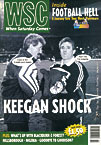 Simon Kuper explains why the collapse of a pay-per-view channel in Holland is likely to have an effect on the relationship between football and television in the UK
Simon Kuper explains why the collapse of a pay-per-view channel in Holland is likely to have an effect on the relationship between football and television in the UK
I happened to be in Amsterdam on the Saturday in February when the chairman of the Dutch FA famously announced “We’re going to start something new.” He revealed that Holland’s clubs had sold the TV rights to their matches to a new cable channel.
Now it has all gone horribly wrong. The channel, Sport 7, is bankrupt, and Ajax, PSV Eindhoven and Feyenoord are about to sell the rights to their own home matches. Sir John Hall, David Murray, Fergus McCann and other British club chairmen are watching closely.
But to return to that February Saturday. The Dutch FA was starting something very new indeed. For decades, football highlights on state TV had been a national ritual on Sunday evenings. Now Sport 7 was going to show sport 24 hours a day, with many matches live. The idea was that everyone could watch the new channel, as it would charge viewers just 70p a month. The clubs would become rich, as the channel would pay each of them £1 million a season for seven years. Since only a handful of Dutch sides draw crowds of more than 10,000, that was big money indeed. Players’ salaries shot up and tiny provincial outfits began planning glitzy stadiums.
But even as the deal was being revealed, it began going wrong. The nation was appalled. Selling the increasingly weird Queen Beatrix or the tiny, incompetent Dutch army might have caused less fuss. Football, after all, was part of Holland’s heritage. It is only thanks to the national soccer team that many people around the world have heard of the country at all.
That same weekend, the Dutch cabinet met in an emergency session and decided that nobody should be charged to watch matches. Those British unfortunates who own Sky dishes may laugh hollowly at the thought of paying just 70p a month for football, but to the Dutch no sum of money is too minute to fret over.
The cabinet made the clubs sell highlights to state television as well as other rights to Sport 7. This was brave of the government, as Sport 7 was set up by some of the country’s biggest companies, including Philips, the ING Bank that owns Barings, and KPN, the privatised national telecom company.
Once state television was allowed to show highlights, Sport 7’s purchase lost most of its value. Few people bothered to try out the new channel. In Amsterdam it was hard to get hold of anyway, as it was on a special cable service that included porn movies and Chinese-language TV. The few who did watch Sport 7 reported that it was very bad.
Also, the new channel started from a false premise. True, the Dutch love watching football: 23 of the 25 best watched television programmes in 1995 were soccer matches. But people only want to see the three big clubs and the national team. Most Dutch football is bad, and unlike in England, the small sides have almost no following. Virtually everyone supports Ajax, PSV or Feyenoord. The new channel, with 24 hours a day to fill, was showing lots of football that no one wanted to see. And as for its korfball and handball programmes….
Meanwhile, things were also going wrong for Sport 7 in court. Feyenoord, watched closely by British club owners, argued that it owned the rights to its home matches. The club claimed that the Dutch FA therefore had no right to sell its games to Sport 7. In December a judge said he thought Feyenoord – backed by Ajax – was quite right. Sport 7 collapsed. No one was watching it, and now it looked like losing the rights to show Feyenoord and Ajax matches.
The collapse was catastrophic for the small clubs. Each had so far only received £520,000 from Sport 7, and the channel refused to pay out the next six-and-a-half season’s worth of money. There was panic. RKC Waalwijk had built a new stadium on the promise of TV money. Sparta Rotterdam had given its two stars, twin brothers called De Nooijer, almost Ravanelliesque contracts to stay at the club. Telstar, a tiny club on the coast, immediately approached neighbours Haarlem offering to merge. About 20 of Holland’s 36 clubs now think bankruptcy is a risk.
But the big clubs are delighted. They will sell the rights to their own home matches now – no more collective deals for them. Just before Christmas, Ajax sold its game against PSV to state television for a huge sum. (Ajax lost the match 0-2, by the way, and PSV now seem sure to win the league.) Sir John Hall et al believe that what happened in Holland could happen here too. If a Dutch judge says that clubs own the TV rights to their home matches, judges elsewhere in Europe may agree. That would mean the likes of Newcastle and Rangers pulling out of their collective league deals and making much more money selling their own rights. The astonishing result: the rich would get richer and the poor poorer.
From WSC 120 February 1997. What was happening this month